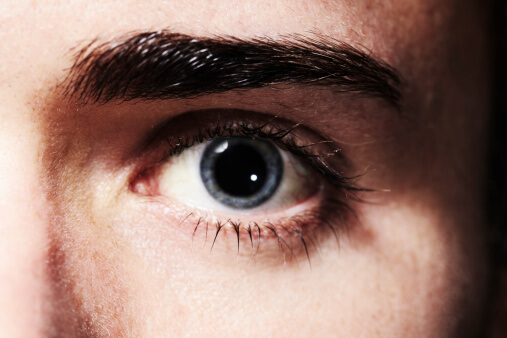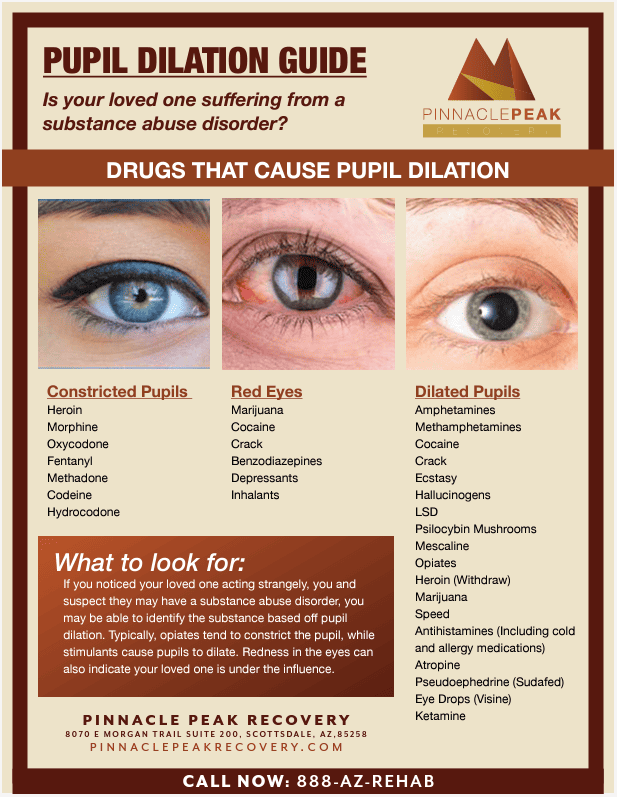If you have a loved one who is abusing drugs or alcohol, you have likely noticed multiple signs of substance use which may be concerning. These signs can be physical, behavioral or emotional. One telltale sign that someone is abusing certain drugs is dilated pupils.
Now for the important question: What drugs cause dilated pupils?
Arming yourself with these facts can help you become more aware of the signs of drug addiction and alcoholism and will allow you to act quickly if you do recognize that there may be a problem specialized rehab facility to get them the help they need. Knowledge is power and overcoming substance use is a difficult foe which oftentimes requires a lot of effort and resources to achieve successfully.
The science behind drugs causing dilated pupils
Your pupils are the black dots in the center of your eyes that change in size in order to regulate the amount of light that enters. This light regulation is crucial to things like normal vision and focus. The size of your pupil is directed by the colored portion of your eye called the iris. Although pupils are generally responsive to your needs for better vision, they sometimes change size as an emotional response or due to chemical changes in the body.
Illicit Drugs Often Cause a Pupil to Dilate
Chemical changes in your body that affect your pupils can include medications and illicit drugs like heroin, methamphetamine, cocaine and marijuana. Dilation due to substance use or taking such medications is usually a temporary reaction to the substance. Poisoning can also cause dilation of your pupils, as can brain injury and disease.
While these other, non-drug related issues can cause dilated pupils it is one of the most common signs of drug abuse. Knowing what drugs cause dilated pupils can be extremely helpful in not only identifying that someone has a substance use problem, but it can also help determine what kind of drugs they are abuse.
This is important because it can help determine whether or not someone may require a medical detox program before entering into a program like a inpatient drug rehab or an outpatient drug rehab.

What drugs cause dilated pupils?
When variations in lighting, brain injury, disease or other various factors that may cause pupil dilation can be ruled out, it is very possible that your loved one’s constricted or dilated pupils may be due to substance use. Knowing what drugs can cause dilated pupils can help you to determine what substance they are using. Drugs and medications that can cause dilated pupils are:
- Methamphetamines and other amphetamines
- Antihistamines (Including cold and allergy medications)
- Atropine
- Pseudoephedrine (Sudafed)
- Cocaine
- Marijuana
- LSD
- Heroin withdrawal
- Eye drops (Visine)
Why Pupils Might Be Dilated
If you notice your loved one’s behavior has been changing you may be curious to know what drugs cause dilated pupils. Be aware that if your loved one is in detox when you notice dilated pupils, it may be a symptom of withdrawal.
Withdrawal from heroin and other opioids can cause dilated pupils. When the user is under the influence of drugs like heroin, their pupils actually become greatly constricted and tiny. This is often referred to as "pinpoint pupils".
However, once the user begins to detox from those drugs their eyes have the opposite reaction and the pupils become dilated. It is important to consider dilation as one sign of possible drug use, but it is not the only determining factor. Substance use comes along with a number of rather serious and concerning signs and symptoms, all of which can help you and the rest of your family determine how dire your loved one’s situation truly is.
With information like what drugs cause dilated pupils at hand, along with the various other signs of substance use you will be able to recognize substance use issues earlier. The earlier you can recognize drug addiction and alcoholism the better the prognosis for your loved one once they are admitted into an inpatient drug rehab.
Other Signs of Substance Use
Unfortunately, substance use issues like drug addiction and alcoholism can present itself in different ways depending on the individual, what substance they are using, and other various factors. Some people are able to hide their issues very well, making it extremely difficult to determine if they have a problem.
You may have a very strong suspicion they need help but hesitate to say anything because you are not certain. There are many ways to potentially identify if your loved one may be struggling with an addiction, but pupil size is one of the most common ways to easily identify this. When pupils are dilated, other symptoms often point to substance use or poisoning as well. These symptoms include:
- Slurred speech
- Memory loss
- Insomnia
- Paranoia
- Isolation
- Financial/Employment issues
- Lack of motivation
- Sudden weight loss or weight gain
- Runny nose or sniffling
- Eye redness or excessive blinking
- Bulging eyes
- Tremors or shaking
- Sudden changes in friends or hobbies
- Legal trouble
- Tooth decay or loss
- Deterioration of personal grooming habits
- Skin picking
Pupil Dilation or Other Signs: We Can Help
While it may be uncommon for someone to exhibit every single one of these signs of drug abuse or alcoholism, if your loved one is showing signs of more than one or two of them then there is legitimate cause for concern. If you do notice these signs the important thing to remember is that you should not panic.
There is help available, but you must speak to your loved one in a compassionate and caring manner in order to voice your concerns. If you and the rest of your family do not feel comfortable doing this alone, there are professional interventionists that specialize in helping families confront their loved ones about getting help at a drug rehab facility.
Help For a Loved One Is Here
If you believe that a loved one may be using a substance, we're just a phone call away.
What to Do if Someone Needs Help
If you recognize multiple signs of drug abuse and suspect that your friend or family member is struggling with substance use, there are multiple things that you can do to help the situation. Knowing what drugs cause dilated pupils can be helpful, but it is important to get a more specific idea of exactly what your loved one is struggling with in order to help them to get the most appropriate form of treatment for them.
Say something – Talk to your loved one about your concerns. Don’t be accusatory or judgmental, instead tell them what you have noticed and offer them help and support. It is never a good idea to wait for the situation to get worse, as the longer someone abuses drugs and alcohol the more difficult it can be to fully heal from the problem. Be prepared for excuses and denial and respond with specific examples of their behavior which has concerned you.
Practice self-care – Don’t allow the situation to overwhelm you with stress. It is important that you remain the calm and collected party in the situation. Many families who are dealing with a loved one struggling with addiction end up neglecting their own needs, worsening the situation.
Make sure you have people you can talk to and lean on for support in these difficult times. It is also important to stay safe by avoiding dangerous situations.
Don’t blame yourself – It is important to support your friend or family member and encourage them to get help at a drug rehab facility, but unfortunately you cannot force someone to change. Let your loved one accept responsibility for their own decisions which is an essential step on the way to recovery. If your loved one is not ready to admit that they have a problem and get help, then let them know you will be there for them when they are. If this happens you cannot blame yourself.
Find an interventionist – While some families may feel that they are able to effectively convince their loved one to get help, it can be a tricky situation to do alone. Professional interventionists are not only well versed in the symptoms of drug abuse, but they are also specially trained to help family members come together and convince their loved one to get the help that they so desperately need.
An outside perspective on the situation can oftentimes be crucial, as many families participate in damaging enabling behaviors without even knowing it is happening.
Pinnacle Peak Recovery In Scottsdale
Now that you know what drugs cause dilated pupils, if you have a loved one you suspect may be struggling with substance use like drug addiction or alcoholism, then getting help from an inpatient treatment facility is usually the best course of action.
Treatment at a licensed and nationally accredited recovery facility that employs master’s level therapists is the best way to ensure a healthy recovery and long-term sobriety. Pinnacle Peak Recovery is here to make sure that you know you are not alone on your journey to get help.
Our alcohol and drug rehab in Scottsdale, Arizona specializes in providing truly individualized dual-diagnosis treatment for everyone. Located just outside of Phoenix, Arizona our beautiful facility provides a beautiful and serene environment for you or your loved one to receive the world-class treatment options that we offer.
We know that dealing with substance use can be a stressful time for any family or individual. In addition to providing the best drug and alcohol treatment in Arizona, we strive to make the admissions process as quick and as simple as possible.
Call us today to get the drug rehab treatment that you or your loved one deserve. There is no need to fight against drug addiction and alcoholism alone. We have an experienced team of professionals available 24/7 to assess the situation and help guide you through the admissions process to make sure that you get help as quickly as possible. A healthcare professional is just a phone call away at 888-786-5590 for more information about treatment options and to verify insurance.

